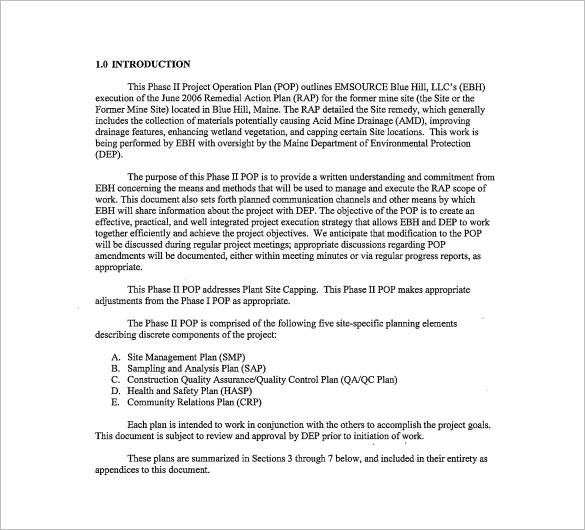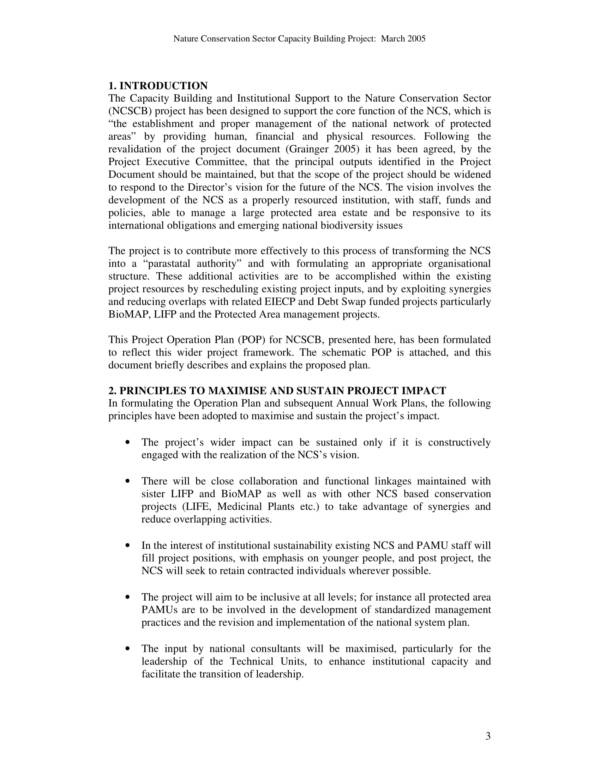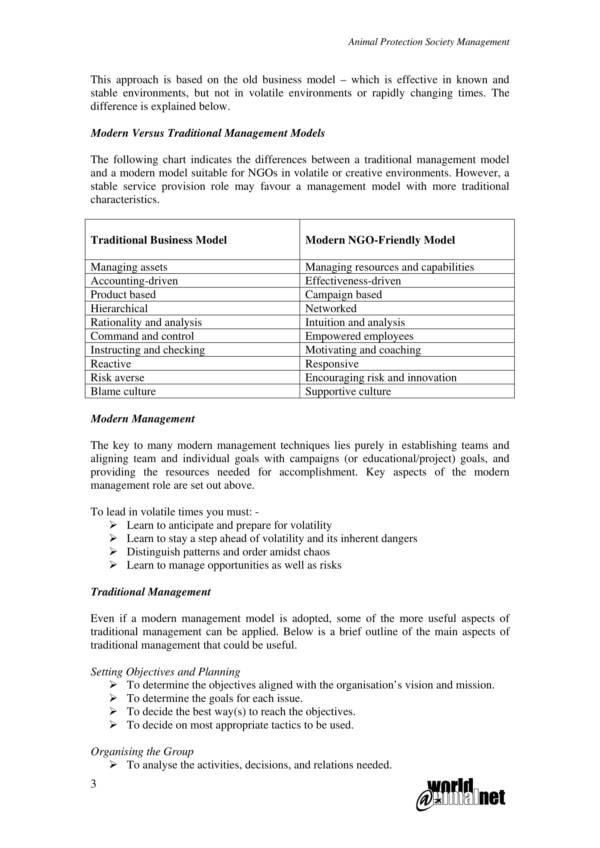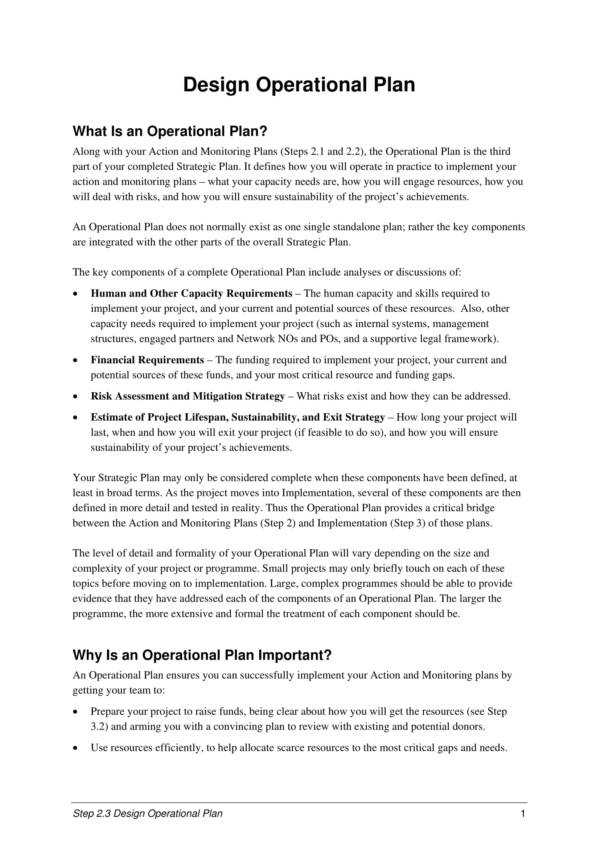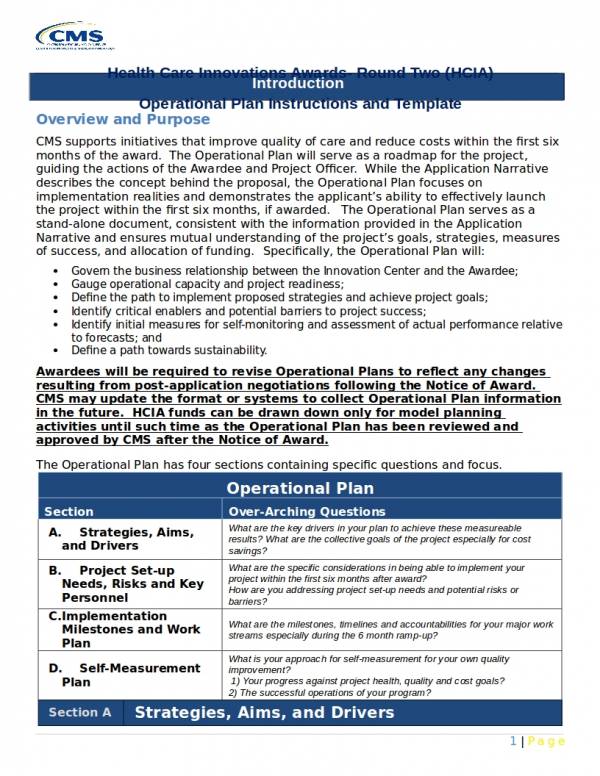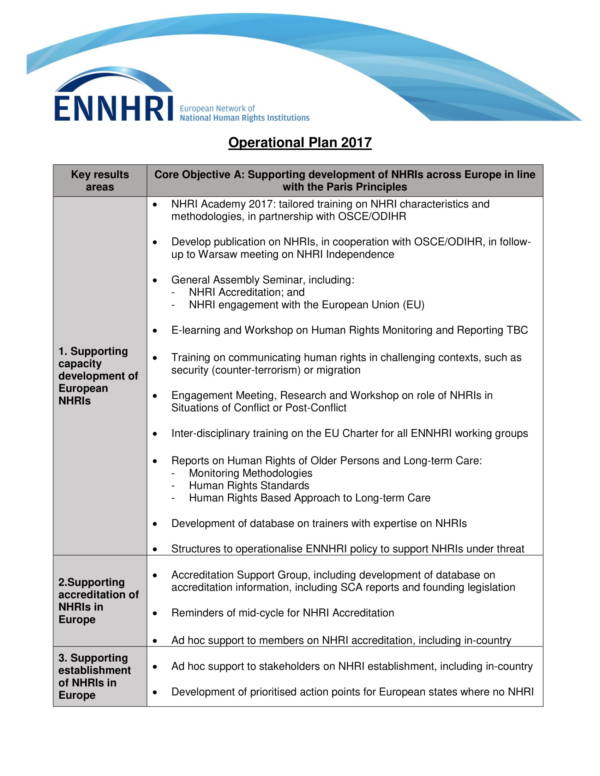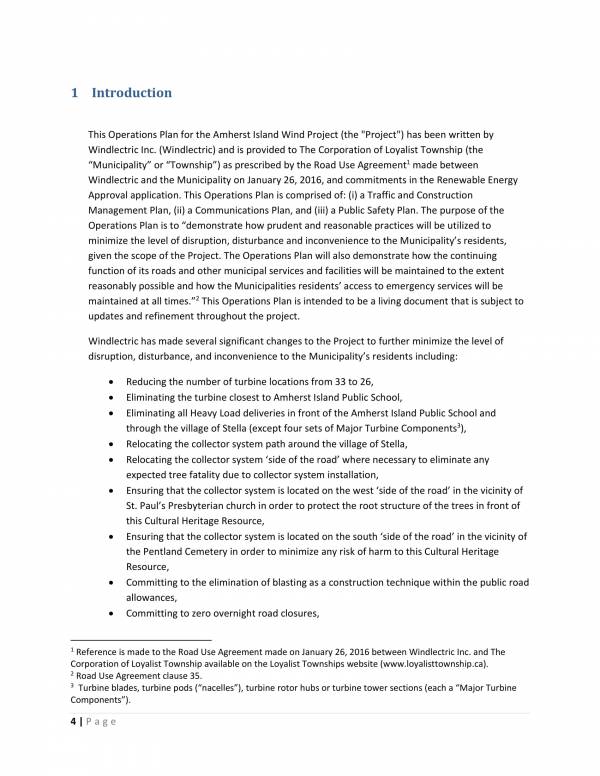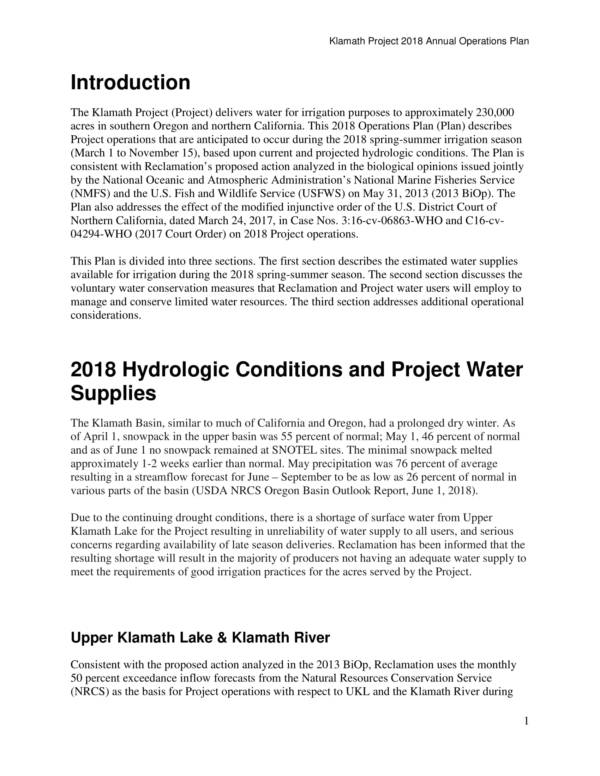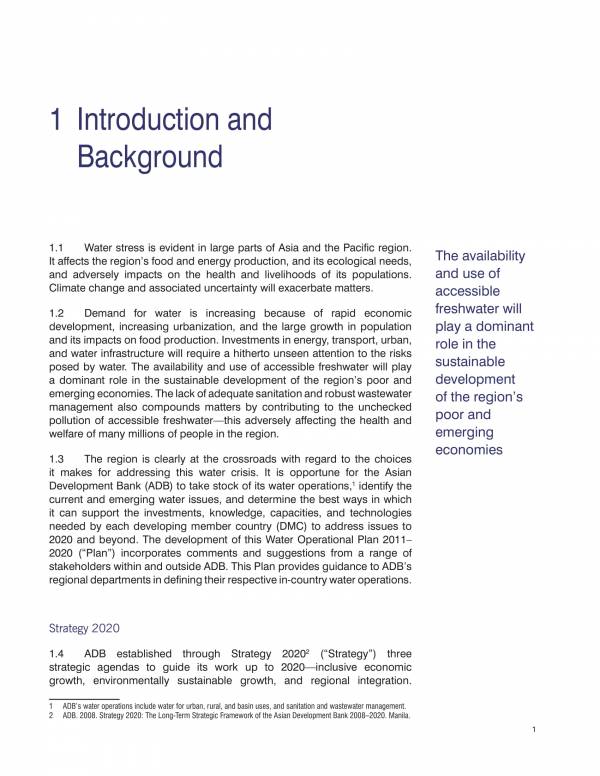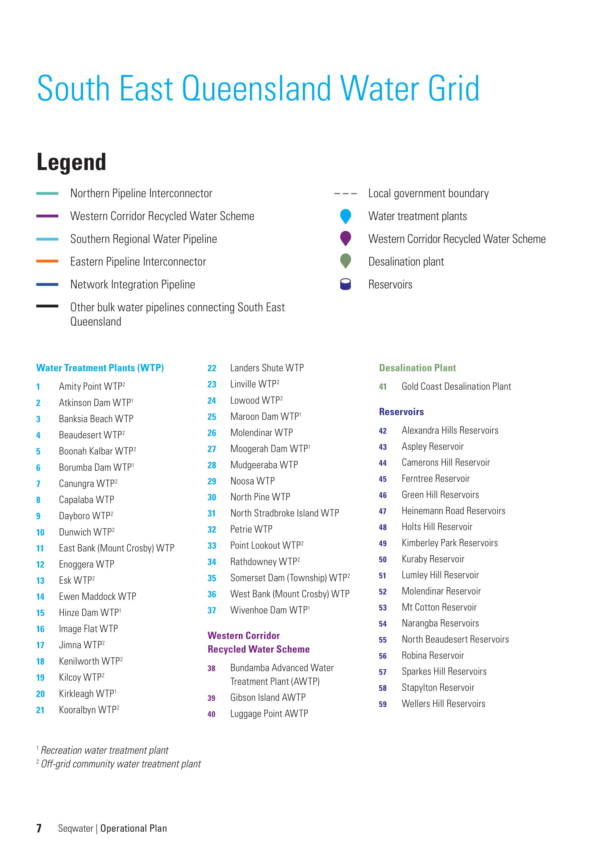A project is a particular task or endeavor that is undertaken by an entity or organization in order to reach a specific set of goals and objectives. Projects could either be long term or short term projects. They tend to always have a start date and an end date. So when once the goals and objectives of that project has been fulfilled, it will then cease to exist and another project will come to light or will be started.
Regardless of how big or small a project is, it needs to be planned and managed all the same as those business tasks and activities. A project operational plan is a tool used to properly and successfully manage a particular project. The operational plan works the same as the operational plans used in certain institutions where the day-to-day tasks or activities of the said project is determined and scheduled.
Project Operational Plan Template
Project Operational Plan
Project & Time Management Operational Plan
WWF Operational Plan
Innovation Center Project Operational Plan
Printable Operational Plan Sample
Uses of a Project Operations Plan
Which parts of the project is a project operations plan useful? There are a lot of areas where it can be used and where it has proven to be useful. To be able to learn about these uses, we have made a list of them below.
- Through a project operations plan, the strategies or steps that an organization is going to take to fulfill a particular project is shown in detail. This can possibly become a basis to determine if the strategy is feasible and effective.
- A project operation plan is used both in managing small scale and large scale projects, but they are more commonly used by sub-contractors in managing large scale public works projects.
- Having a project operations plan in place allows the organization to avoid or prevent doing unwanted or unplanned actions that doe not provide assurance in accomplishing the goals of the project. On the other hand, unplanned steps or actions may not help the project succeed in accomplishing its specific goals and objectives.
- Government agencies make use of project operations plan in determining whether to approve the a certain project or not. This is because they can tell whether the predetermined course of action indicated in the plan is effective or not.
- The project operations plan is a detailed document where information related to the length of the project, budget needed for every step taken in the project, the people involved in the project, nature of the project, history of the project, etc. are provided. In other words, it is very good and reliable source of information when it comes to the project that is being done.
- It is where the specific goals and objectives of the project can be found.
- The specific roles and job description of the participants of the project are also provided in the project operations plan so that it will be easy for everyone to determine what every participant is assigned to do.
What other uses of a project operational plan do you know of? The use of a project operational plan may vary depending on the type of project or depending on the specifications of the organization who handles it. We have other related articles that you will find useful, like Annual Operational Plan Samples & Templates, Simple Operational Planning Samples & Templates, and HR Operational Plan Samples & Templates.
What Are the Types of Operational Projects?
Choosing a location, establishing and overseeing a supply chain, production scheduling and control, and inventory management are the four types of operational projects. Let us take a closer look at each of these types to be able to learn more about them.
Choosing a Location
How did choosing a location become a type of operational project? As mentioned above, operational projects have specific goals and objectives that should be fulfilled. Once they are fulfilled the project will cease to exist. Choosing a location refers to finding a suitable place where an entity or organization can put up or build their business. Finding a location depends on certain factors such as the nature of the business, the type of business being put up, etc.
Establishing and Overseeing Supply Chains
Establishing a supply chain is the main goals or task of this type of operational project. The activities involved are purchasing of raw materials, how they should be shipped and distributed to customers. In this project, creating strategies in order to increase the business revenue is also done as well conducting audits and analyzing the current operating conditions.
Production Scheduling and Control
Ensuring that schedule of production is followed and close monitoring is done is an important task in operational projects. This is because it allows the manufacturers or organizations to cut costs and at the same time eliminate wastes in the project, which could turn out to be costly.
Inventory Management
An inventory is a list of goods or items that an business stocks or stores in large storage areas to be distributed to their customers once orders for the items are placed. It is important that a business manage its inventory seriously and make sure that they have just enough inventory to fill in customer demands. Too much inventory may be wasteful for the business and having too little may risk not being able to supply the demand of customers.
You may also check out articles related to this topic, like School Operational Plan Samples & Templates and Risk Management Plan Samples & Templates.
What Things Are Included in a Project Operational Plan?
The following is a list of things that should be included in an project operational plan.
- The name of the specific project being worked on and its description
- The specific goals and objectives of the project
- The name of the organization who manages or is responsible for the project
- The names of the entities who are involved in the project, like the contractors, sub-contractors, etc.
- The specific start and date of the project
- The detailed steps to be taken or the strategy required to work on the project successfully
- The materials, requirements and resources needed for the project
- The schedule of tasks or the timetable followed to carry out the tasks
- The location where the project should be done or implemented
- The desired or expected outcome for the project
- Health and safety standards to be followed
- The monitoring process
There are certain parts of a project operational plan that are specific to the type of project. That is why having knowledge about the project is essential in order for you to be able to point out additional parts that are also important for the project. Other related articles that you may want to check out are Operating Plan Templates, Marketing Plan Templates, and Growth Plan Templates.
Where Can Operational Plans Be Used?
Most business organizations use operational plans, especially large corporations. But the use of operational plans are not just limited to projects and large organizations. There are different areas or institutions that make use of an operational plan in planning for their daily tasks and activities that are based on the strategic plans of the organization as a whole. The following are some examples of the areas where an operational plan is used.
- Schools, colleges, or universities
- Human Resources
- Annual operational plans
- Safety and security
- Hospitals
- Events
- Information technology management and control
- Military or police
- Restaurants
- Hotels
- Cleaning services
- Business
The list above are just some of the few examples where an operational plans can be used. To learn more about plans and other related topics, you may visit out website. We have their interesting titles, like Project Plan Sample & Templates and Content Marketing Plan Samples & Templates.
Wind Electricity Operations Plan Sample
Reclamation Project Operational Plan
Sample Water Operational Plan
Detailed Water Operational plan Sample
Sustainable Transport Initiative Operational Plan
Tips in Writing Effective Operational Plans
Want to make effective operational pans? Follow these simple tips to learn how.
- Operational plans are creative with the aim of having the members of a team or organization become involved in the planning process. This means that you will need to involved the members of your team so that you can devise a plan based on their different output.
- Write clearly and concisely. As much a possible, use simple words to avoid unwanted confusion and misinterpretation of instructions or details in the operational plan.
- Your operational plan should support your organization’s strategic plans and tactical plans. Base your operational plan on the given strategic and tactical plans that way your plan will be able to contribute to the goals of the organization.
- Provide a schedule or a specific time frame on when tasks or activities should be done.
- List down specific instructions and guidelines on how tasks should be carried out.
- Assign specific tasks or roles and responsibilities for each member of your team.
You can definitely create a useful and effective operational plan if you follow the tips listed above. We hope that you are able to learn from this article. For more related samples and templates, feel free to visit our website.
Related Posts
FREE 7+ Fashion Business Plan Samples in PDF
FREE 10+ Sprint Planning Samples In MS Word | Google Docs | PDF
FREE 10+ Wedding Planning Samples in MS Word | Apple Pages | Powerpoint | PDF
FREE 9+ Monthly Study Planner Samples in PSD | Illustrator | InDesign | PDF
FREE 9+ Sample Curriculum Planning Templates in PDF | MS Word
FREE 10+ Teacher Development Plan Samples in MS Word | Google Docs | Apple Pages | PDF
FREE 10+ Basketball Practice Plan Samples in PDF
FREE 12+ School Business Plan Samples in PDF | MS Word | Apple Pages | Google Docs
FREE 7+ Client Strategic Plan Samples in PDF | MS Word
FREE 11+ Trucking Business Plan Templates in PDF | MS Word | Google Docs | Pages
FREE 7+ Small Hotel Business Plan Samples PDF | MS Word | Apple Pages | Google Docs
FREE 14+ Bakery Business Plans in MS Word | PDF | Google Docs | Pages
FREE 4+ Yearly Lesson Plan Samples in PDF
FREE 50+ Strategic Planning Samples in Google Docs | Pages | PDF | MS Word
FREE 10+ Construction Project Plan Samples in MS Word | Google Docs | Apple Pages | PDF

